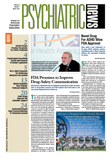The Tax Relief and Healthcare Act of 2006 created the Physician Quality Reporting Initiative (PQRI), sometimes referred to as the pay-for-performance, or P4P, initiative. The Centers for Medicare and Medicaid Services (CMS) issued a list of 74 physician quality measures earlier this year. Physicians who report the applicable measures in at least 80 percent of their covered encounters between July 1 and December 31 will receive a bonus that is projected to be 1.5 percent of their total Medicare-allowed charges for that period. If more than three measures are applicable, physicians have to report only three of them 80 percent of the time to be eligible for the bonus.
For psychiatrists, there is currently only one quality measure:
Antidepressant Medication During Acute Phase for Patient With New Episode of Major Depression
Description
Percentage of patients aged 18 years and older diagnosed with new episode of major depressive disorder (MDD) and documented as treated with antidepressant medication during the entire 84-day (12-week) acute treatment phase.
Other quality measures may prove to be relevant for psychiatrists, but not enough information is available yet to determine whether psychiatrists will be expected to report on them.
As of press time, the final specifications for the psychiatric measure have not been released. It is expected they will closely mirror the version used in the 2006 PVRP (Physician Voluntary Reporting Program) pilot. It has yet to be determined whether the quality measures will be reported using the G-codes that were used in the 2006 pilot program or the new Category II CPT codes. Whatever codes are required, the code descriptors are expected to be the ones used in the pilot program:
•
Patient documented as being treated with antidepressant medication during the entire 12-week acute treatment phase.
•
Patient not documented as being treated with antidepressant medication during the entire 12-week acute treatment phase.
•
Patient was not treated with antidepressant medication or was not an eligible candidate for completion of the entire 12-week acute treatment phase.
Starting July 1, physicians who indicate patients have one of the ICD-9 diagnoses for major depression (296.20-296.24, 296.30-296.34, 298.0, 300.4, 309.1, and 311.0) can report on this quality measure by using the appropriate code on their Medicare claim forms along with the appropriate evaluation-and-management or psychiatry CPT code. To meet this quality measure last year, the code could be reported either at the beginning of treatment for patients who were prescribed a 12-week course of medication or at the end of the 12 weeks. Be sure to check the CMS and APA Web sites for updated specifications of this measure.
For 2007 the PQRI is paying for reporting on the quality measures, whether they have been met or not. For this reason, using codes for the descriptors that say the measure was not met will also contribute to eligibility for the bonus.
While the bonus is projected to be 1.5 percent of the Medicare allowed amount for all filed Medicare claims, the bonus is capped so that the 1.5 percent is really the maximum that will be awarded. Only claims that have been paid will be used to calculate the bonus. Claims must have reached CMS's National Claims History file by February 29, 2008, and CMS will be using physicians' NPI to track claims, so that's one more reason to be sure you have your NPI (
see Update on Use of National Provider Identifiers ). The bonus will be issued in a lump sum in mid-2008.
Many questions remain about the specifics of how the PQRI will work. When more information becomes available, it will be posted on the APA Web site. You can also check the CMS Web site for a complete list of the quality measures and the latest information on the PQRI at<www.cms.hhs.gov/pqri>.▪
